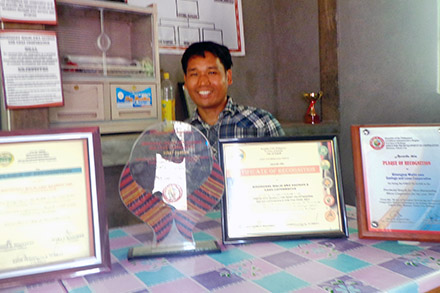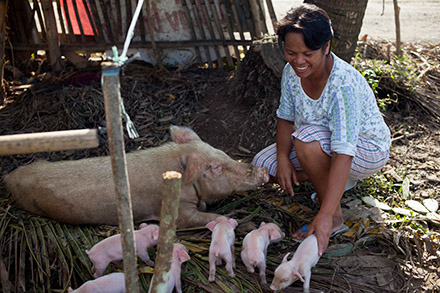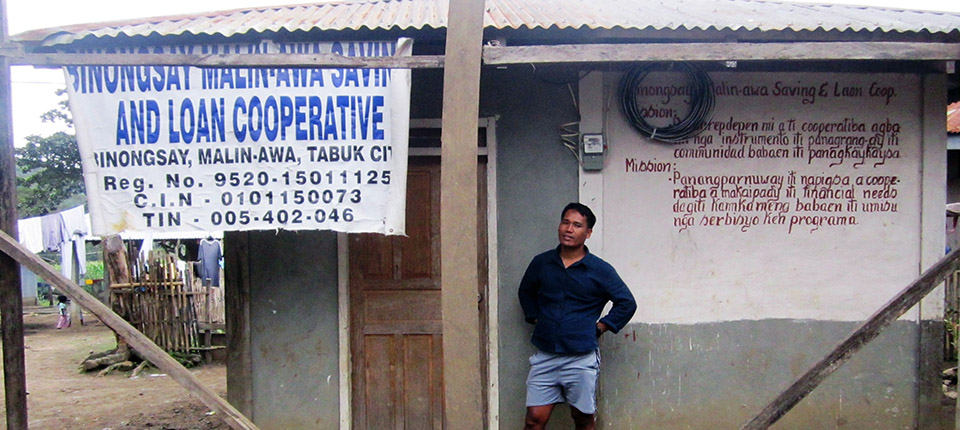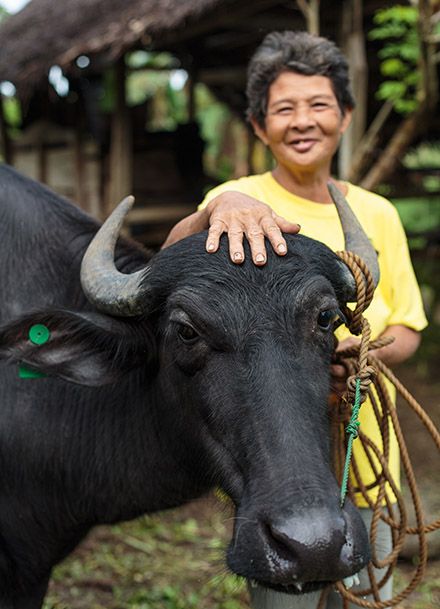A river cuts through a rock not because of its power, but its persistence.

Passion, dedication and values coupled with perseverance can move mountains, and Wilson Pan-oy, our 2015 Golden Talent Awardee, is a living testament. He is one of the original participant families of “Revitalizing the Environment through Indigenous Vantage Enterprises (REINVENT) Project” funded by BOTHAR in Lumin-awan, Tabuk, Kalinga, Northern Philippines. The project was implemented on July 2006 to June 2009 by Tabuk Lumin-awaan Center (TLC), the development arm of the Social Action Center (SAC) of the Vicariate of Tabuk.
Project REINVENT aimed to increase and diversify family income and improve the families' habit of savings. One of the project's strength is savings. Early on the project the families realized the importance of group savings and sustaining it for the groups' success and security.
Wilson was born in Botbot, Tinglayan, Kalinga in July 12, 1976, to a poor family whose main source of living was farming a small parcel of land and kaingin (slash and burn). He has two sisters. When Wilson was 4, his father, Vicente Pan-oy was struck by lightning while out in the rice field and died instantly.
"Now that I am a father myself, I often wonder how it feels to have a father growing up,” Wilson said. “I only have a faint memory of how secured my sisters and I felt when he was around. I watched my mother raise the three of us in poverty and hardship—life was so difficult then—but my mother made both ends meet. Early on, I knew life would not be easy for us and, being the only boy in the family, I would have to learn the things my father would have done if he was with us,” Wilson said, with tears forming in his eyes.
"I did not finish my education, only finished my third year of high school. When you live in so much poverty and without support you don’t have much choice. So I decided to stop schooling to help my mother put food on our table. I was a farm laborer earning small income. I also helped my youngest sister finish her education. When she finished college and found a job, I felt so accomplished."
Wilson is now married to Alma Basnic, from his same tribe. They are blessed with a son, Gideon, who is now 6 years old. Wilson's family built a small house on a 1 1/2 square-mile lot planted with rice and vegetables, which provide harvests enough for the family's needs. "When Gideon arrived, I vowed to myself that I would give him a comfortable life. Though it might not be grand or luxurious, it would be enough for him to feel secure and never feel hunger," Wilson said.
"You cannot ignore Wilson's presence in the group; his leadership is very natural and sincere," Jun Dom-oguen, Program Officer for Heifer Northern Philippines, said. Wilson was chosen as one of the Community Animal Health Workers (CAHW), and his dedication was instrumental in the success of REINVENT project. In the past, Kalinga allowed pigs to roam around, not tied or kept fenced, posing serious health problems to the community, especially to children. Through his leadership as a CAHW, all pigs were housed, enabling backyard gardening to prosper and a healthier living environment.

"As the CAHW I ensure improved animal management is strictly practiced by all participant families. Through this we can be assured that Passing on the Gift will continue and that more families will benefit from the project," Wilson said. By practicing what he preaches, Wilson's family earns additional 60,000 pesos (about $1,364) annually from pig sales. The money has helped them to improve their home and meet their daily needs and fund their son's education. "We also sell our garden produce but most of the time it is for family consumption. Almost everything we eat, we produce," Wilson said.
When Heifer Philippines approved the implementation of the second TLC project, “Cogawe Sustainable Highland Agri-livestock Resources Enterprises (Co-SHARE) Project,” in 2008, the Vicariate of Tabuk selected Wilson as the Local Community Facilitator (LCF), giving high regards to his accomplishment as REINVENT's CAHW.
During Wilson's leadership with the Co-SHARE project 46 original families and two generations of pass on families (92 in all) were able to receive tangible and intangible gifts from the project within two years—a feat other projects might take three years to accomplish. The Co-SHARE families continue the Pass on the Gift today.

While acting as the LCF, Wilson realized, like REINVENT Project, Co-SHARE project's strength lies in its group savings. With this strength Wilson planned to sustain the gains of their self-help groups (SHG).
“I was challenged and inspired by Heifer’s Values-Based Holistic Community Development (VBHCD) approach to come up with a values-based cooperative that would sustain our gains from the projects. Armed with the knowledge and a co-op in mind, I started to organize the original REINVENT SHG and the first pass-on SHG in Binongsay into a cooperative through meetings and close coordination. By October of 2008, I was able to register our 33-member co-op to Cooperative Development Authority (CDA) and was elected as the co-op manager by my fellow participant families. We started with a minimum share capital of only 5,000 pesos (about $114), initial capital of 500 pesos (about $12) and 50 pesos (about $1.14) membership fee. The Cooperative's main business is micro-credit with a 2-percent interest rate per month."
In the beginning, Wilson’s time was divided between his obligations as Co-SHARE LCF and co-op manager, and the co-op progress was slow. Some members backed out, thinking Wilson was using co-op funds to attend trainings for his own personal interest.
Co-op member Luis Bulayang said, “A few members thought the co-op might die, but majority of us trusted and supported Wilson all the way; he told us the trainings were for the co-op's benefit and were all sponsored by the People’s Credit and Finance Association (PCFA), a group that assists micro-cooperatives. The annual audit proved the co-op books were intact. Members who had backed out returned, and membership increased. We cannot blame those who doubted, many co-ops in our province are tainted with mismanagement; however, Wilson proved to all those who doubted values are at the core of our Co-op.”
The co-op’s capital in 2008 was only 78,870 pesos ($1,793) with its total assets at 99,114 pesos ($2,253). By the end of 2014, its total assets increased to 1,227,458 pesos ($27,897). The co-op gives loans for agri-enterprise, emergency or providential purposes. The co-op also operates an agri-input store for the sale of farm inputs such as fertilizers and biologics.
Wilson’s hard work started to bear fruit in 2013 when the cooperative was selected as second place for the Most Outstanding Cooperative (Micro Co-op Level, with assets below 3 million pesos) for the City of Tabuk and first place in the Province of Kalinga. They received a 20,000-peso ($455) cash reward, which they used to buy a lot to construct a bigger building across from their current office. Recognizing the benefits the people of Binongsay and Malin-awa receive from the Co-op, Vice Governor Jessie Mangaoang of Kalinga contributed 50,000 pesos ($1,136) in February 2014 for the improvement of the co-op building. And the vice governor gave another 100,000 pesos ($2,273) in February 2015. In 2014, for the second time, they won first place as the Most Outstanding Cooperative Micro level. They used the $455 cash reward to buy office equipment that year.
In 2014, the co-op was able to give a total of 73,444 pesos ($1,669) in dividends and patronage refunds to all of its members, distributed through the SHGs.
As of March 2015, the co-op had 142 members. All members must undergo and understand the VBHCD process.

"Looking at where our co-op is now—I can't help but feel proud. I never doubted that Heifer’s Cornerstones, Participatory Self Review and Planning (PSRP) and participatory leadership would make our co-op better, stronger and more sustainable. Passing on the Gift® (POG) is also one of the driving forces that keeps our SHG and Co-op intact. In fact, we adapted the idea of POG when five members of the co-op applied for a loan so they could buy a water buffalo. The co-op purchased five water buffalo for the five families not as a loan, but as a gift so they could further improve their farm activities, with the condition that once the buffalo gives birth, they will pass on the offspring to another needy co-op member. A water buffalo is an important asset in farming and owning one is an honor in Kalinga culture," Wilson said.
"The co-op made the families in my community more secure, more mindful of their future and more trustworthy. In the past, it was very difficult to find a lender, so we usually borrowed from loan sharks. With the interest rates so high, families would be forever indebted just paying the interest never the principal. That scheme has made many families succumb to the vicious cycle of poverty."
“I am glad I did not give up. Truly, when one perseveres anything is possible," Wilson said.
Story by Jun Dom-oguen, Program Officer, Heifer Philippines, and Karla Narcise-Rodulfo, PM&E Manager, Heifer Philippines